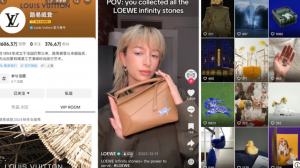Tencent Huiju Luxury, the luxury section of the centralized e-commerce marketplace Tencent Huiju, joined hands with top livestreamer Austin Li. But will it help the fledgling e-commerce platform?

What Happened: Tencent Huiju Luxury (previously known as Famous Products), is the luxury section of the centralized e-commerce marketplace Tencent Huiju, which houses brands’ WeChat Mini Program in one place. It offers WeChat users a one-stop shopping solution with over 12 categories of products and services, while also directing traffic to the brand’s private domains.
Still relatively niche, the centralized e-commerce marketplace within WeChat has tapped the livestreaming sensation, Austin Li, aka, China’s “Lipstick King,” to help increase the marketplace’s exposure. Li, along with seven international luxury brands — Chopard, Dunhill, Fendi, Kenzo, Loro Piana, Ferragamo, and Valentino — will co-launch the applet’s “Luxury Trends Renewal Day” (名品趋势换新日) campaign. Each day, from April 8-14, Tencent Huiju Luxury’s landing page will be taken over by one of the aforementioned brands and will feature a daily video by the “Lipstick King,” showcasing his product picks for spring-summer — in the hopes of inspiring the platform’s users to make a purchase.
The Jing Take: Apparently, the tech giant didn’t create Tencent Huiju Luxury to directly compete with Tmall and JD.com. Instead, the luxury section of the applet simply offers a centralized site where consumers can find the latest products from the high-end maisons and get inspired. When ready to make a purchase, the users are then directed to the brand’s private domain — its WeChat Mini Program — to finalize their purchase.
While still in the early stages of development, Tencent Huiju Luxury continues to be tweaked and tightened. Meanwhile, its content-driven approach, emphasizing user experience and brand storytelling to redefine the online shopping experience, differs from existing competitors Tmall and JD.com, which is the point — no one needs another identical marketplace in an already over saturated market. Continue to read the full article here





